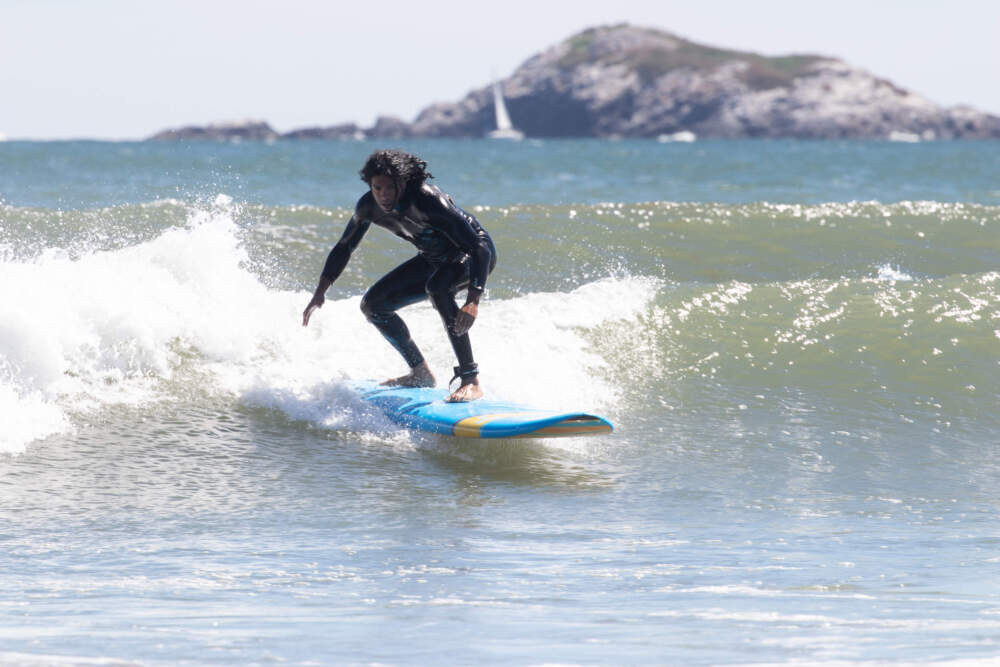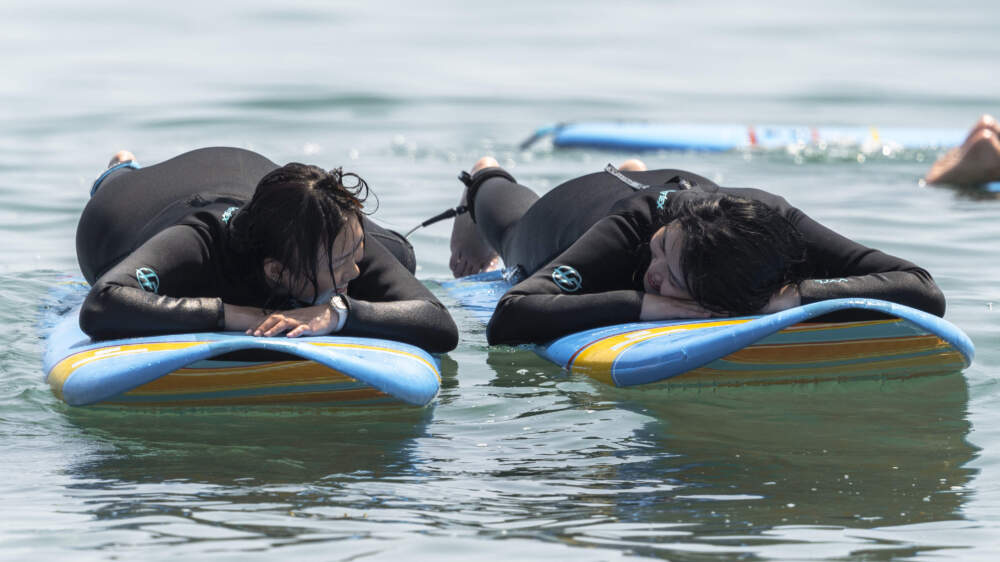Fall is the best season for surfing in Massachusetts. Here’s a guide

Editor’s Note: This is an excerpt from WBUR’s Saturday morning newsletter, The Weekender. If you like what you read and want it in your inbox, sign up here.
New England’s iconic coastline attracts beachgoers throughout the warm summer months. But you probably wouldn’t peg the region as a surf destination.
“You might think of New England for the skiing we have,” Grant Gary, a Boston-based surfer, told me. “We have beautiful mountains. We have great skiing in the winter months. We have really great hiking. But people don’t look at it as a surfing region.”
Gary thinks they should reassess.
“We have pretty consistent surf,” he said. “And then on some specific days, we have world-class surf.”
Gary started surfing 10 years ago while working as a teacher at a high school in East Boston. “When I started, it was pretty common for me to paddle out in the fall to surf breaks that were completely empty,” he told me. But in the decade that’s passed, he’s started to find company.
“Even in the winter time, if there’s a good swell, you can paddle out and there might be 30 or 40 people in the water,” he said.
The thought of diving into New England’s frosty waves might send a shiver down your spine. (After all, the sport is usually associated with more tropical locales like Hawaii and California.) But as CEO of Boston Surf Adventures, a local surf school, Gary is trying to teach folks to overcome their aversions — whether it’s fear of the cold or fear of sharks — so they can also enjoy the sport he loves, without having to travel.
“My goal is to turn Boston into a surf city,” Gary said.
Whether you’re a seasoned surfer trying to find local waves or a beginner curious about picking up the sport, here’s a guide to surfing in our region.

When to surf in New England
It turns out that fall is the best time to surf in Massachusetts — and that’s because of hurricanes. The Atlantic Hurricane Season officially starts on June 1, ending around Nov. 30. This peaks around mid-to-early September, bringing prime waves to our coastline through mid-to-late October.
“Once you start surfing, you think of New England seasons differently,” said Gary. “There’s hurricane season, there’s nor’easter season, and then there’s summertime. If I was going to name a season that’s the best time to learn, it’s hurricane season. And the reason is [because] we have consistent surf and warm water.”
Ronnie Lees, a longtime surfer and owner of Northeast Surfing, explained how the waves are formed. “If we get hurricanes that stay 400 miles offshore, 300 miles offshore, and they start the first week of August, that’s a great surf season,” he said. “You’ll get a groundswell that lasts about seven to eight days. That long-period groundswell is what we surf.”
Most of the time, swells created by hurricanes can result in waves that range from 1 to 2 feet, which is perfect for a beginner, according to Gary. But there are particular days when the waves are much higher, around 6 to 10 feet, when beginners may want to steer clear of the water. However, these wave patterns fluctuate.
“If there’s one really big day, usually the day before and the day after, the [waves] are smaller and more approachable for beginner surfers or even intermediate surfers,” Gary added.
While the ocean’s fickle nature can make it tricky to plan when to paddle out, surf cameras at some of New England’s most popular beaches can help you gauge the waves and see if it’s worth the hike.
Where will I find the best waves?
The North Shore often bears the brunt of coastal storms, and acts as a “storm break,” while Cape Cod blocks the movement of said storms to the South Shore, leading to calmer waters.
Lee says you won’t want to surf the North Shore while a heavy storm is happening, but once it moves out to sea, the beaches in Marblehead and Winthrop are good spots to surf. If you’re along the South Shore or the Cape, he recommends surfing Nantasket Beach in Hull, Green Harbor Beach in Marshfield and White Crest Beach in Wellfleet (particularly in the winter, you’ll get a “better break,” Lees said).
Learning to ride
Alright, now you know where and when to surf. Now comes the important part — how?
If you aren’t already trained, both Lees and Gary’s surf schools offer surf lessons and camps year-round. For most classes, the only requirement is knowing how to swim. “Besides that, you don’t need to be the most crazy in-shape person to start,” said Gary.
There are also organizations like AmpSurf, based out of California, that host regular events and lessons in New England for people with disabilities or those who may need modifications for their board. Gary also suggests The Lavender Lineup, a surf club for those identifying as LGBTQ+ who want to make friends to paddle out with. (Even after lessons, Gary and Lees say beginners should surf with someone more experienced during their first few trips into the ocean as a precaution.)
Field Guide to Boston: Discover — and rediscover — your Boston.[/keyfigures]
Getting started during the chillier months of fall and winter might seem off-putting. But nor’easters make for some of the best waves, says Gary. And new wetsuits do an impressive job of keeping surfers warm.
“Wetsuit technology has evolved so drastically that you can go surfing in the middle of January on the coldest day of the year, and you will feel no colder than if you went out skiing on a cold day in Vermont,” said Gary.
In the winter, surfers wear thick wetsuits with hoods, gloves and boots all made of neoprene. Gary says it’s enough to keep you warm even in frigid water for up to two hours.
“What’s been happening with climate change in New England is that we’re now getting more rainstorms in the winter than we’re getting snowstorms,” said Gary. “But whether it rains, or whether it snows, we get waves. Once you realize you can surf all year round … if it’s raining in Vermont, I’m not going to go skiing. I’ll go surfing.”
P.S. — In case you need another incentive to get started, Nantasket Beach was ranked as one of the cleanest in the state this past summer by the nonprofit Save the Harbor/Save the Bay. Check out the full water quality report for Boston-area beaches here.
This article was originally published on WBUR.org.
A victim of a crypto ‘pig butchering’ scam just got his $140,000 back
NPR investigated a crypto scam company known as SpireBit, which stole hundreds of thousands of dollars from Russian-speaking seniors. Now, some of the victims are getting their money back after a lawsuit by Massachusetts authorities.
Talking to voters at a Wisconsin supper club
Customers and staff at a Wisconsin supper club share their thoughts on the upcoming election.
For some artists, a guaranteed income program has been a lifesaver
The pandemic made financial stability even more difficult for artists. A privately funded Guaranteed Income program for artists in Minnesota helps many find stability and creative freedom.
The audio delay on radio broadcasts of MLB games leaves blind fans behind
A delay of baseball game day audio on radios frustrates blind fans who count on play-by-play broadcasts when they're at the stadium.
U.S. citizens are advised to lease Lebanon amid conflict with Israel
Israel’s airstrikes in Lebanon have forced more and more people from their homes. The U.S. State Department is urging American citizens in Lebanon to leave the country all together.
Snapchat brushed aside warnings of child harm
Newly unsealed documents show that Snapchat ignored employee concerns over the app facilitating harms against minors -- including sextortion, sexual exploitation and the sale of drugs and weapons.

